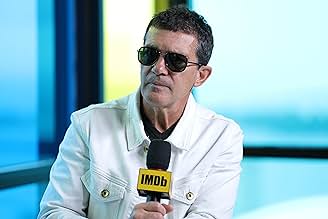CALIFICACIÓN DE IMDb
7.5/10
66 k
TU CALIFICACIÓN
Un director de películas deberá reflexionar sobre las decisiones que ha tomado a lo largo de su vida, cuando su pasado y presente colisionan.Un director de películas deberá reflexionar sobre las decisiones que ha tomado a lo largo de su vida, cuando su pasado y presente colisionan.Un director de películas deberá reflexionar sobre las decisiones que ha tomado a lo largo de su vida, cuando su pasado y presente colisionan.
- Dirección
- Guionista
- Elenco
- Nominado a 2 premios Óscar
- 71 premios ganados y 178 nominaciones en total
- Dirección
- Guionista
- Todo el elenco y el equipo
- Producción, taquilla y más en IMDbPro
Opiniones destacadas
A filmmaker (Antonio Banderas) deals with physical and mental ailments as he approaches old age, settling in to a sad kind of torpor as he reflects on life. People have come and gone and the real pain here seems to be quiet melancholy of regret, his body's (significant) issues notwithstanding. The film meanders a bit and suffers at times with pacing, but through his reflections and flashbacks, it tells a touching story about coming to peace with those we've known in life.
There's the filmmaker's mother (Penélope Cruz), who sent him to a seminary for most of his schooling because she had no money for a secular education, which led to him not learning much. In old age she dies alone in a hospital instead of in her home village, where he had promised to take her. (Oddly, the actor playing the elderly mother, Julieta Serrano, has blue eyes whereas Cruz's are brown, which was a little jarring to me). These are the things that swirl around in his mind as he still grieves over losing her.
There is also the actor from one of his popular films (Asier Etxeandia), who he had a falling out with decades ago, but who he reconnects with and is then introduced to heroin by. He casually tries it and then alarmingly we see him quickly hooked, which makes for what seemed like one of the longer subplots, which I wasn't all that interested in. There is an old lover who surfaces (Leonardo Sbaraglia), a man who disappeared out of his life and is now married with children, and the scene the two share is full of authenticity and warmth. He also recalls a time in childhood when he tutored a handyman for payment of services to his mother, and felt the first flush of desire when he saw him bathing.
I think Almodóvar was wise to draw a line at this last character not physically meeting him decades later, as it gave the film realism and a wistful bit of sentimentality. True to form, he also gives the viewer an explosion of primary colors, and there is certainly a lot of beauty on the screen. That kitchen, especially with its bold red cabinets, made me wonder if such a space would be too loud to live in, but later I read that it was modeled on Almodóvar's own home. I also loved the little touch of the Cruz's character and her friends breaking in to a light song while washing their clothes in the river. Nothing "big" happens here, but in its quiet way, it reflects the director, and his pain and glory in life.
There's the filmmaker's mother (Penélope Cruz), who sent him to a seminary for most of his schooling because she had no money for a secular education, which led to him not learning much. In old age she dies alone in a hospital instead of in her home village, where he had promised to take her. (Oddly, the actor playing the elderly mother, Julieta Serrano, has blue eyes whereas Cruz's are brown, which was a little jarring to me). These are the things that swirl around in his mind as he still grieves over losing her.
There is also the actor from one of his popular films (Asier Etxeandia), who he had a falling out with decades ago, but who he reconnects with and is then introduced to heroin by. He casually tries it and then alarmingly we see him quickly hooked, which makes for what seemed like one of the longer subplots, which I wasn't all that interested in. There is an old lover who surfaces (Leonardo Sbaraglia), a man who disappeared out of his life and is now married with children, and the scene the two share is full of authenticity and warmth. He also recalls a time in childhood when he tutored a handyman for payment of services to his mother, and felt the first flush of desire when he saw him bathing.
I think Almodóvar was wise to draw a line at this last character not physically meeting him decades later, as it gave the film realism and a wistful bit of sentimentality. True to form, he also gives the viewer an explosion of primary colors, and there is certainly a lot of beauty on the screen. That kitchen, especially with its bold red cabinets, made me wonder if such a space would be too loud to live in, but later I read that it was modeled on Almodóvar's own home. I also loved the little touch of the Cruz's character and her friends breaking in to a light song while washing their clothes in the river. Nothing "big" happens here, but in its quiet way, it reflects the director, and his pain and glory in life.
We are what we are, because of choices we made and people we met. Our past defines who we are today. Can we change if we think we go a direction that isn't a "good" one? Maybe we can - but that is not the major revelation or plot that you get served here.
Here you get a director, who seems to have lost his ... muse and sense and so many other things. Not his will to live of course ... no matter what he does or what he puts in his body, nothing implicates he has lost that will. Quite the opposite can be seen (subtly I'd say) in an interaction he has while buying drugs at a know place apparently.
He has regrets, he has sorrows and he still has a lot of things in him that want to get out (one way or another). Played fantastically by Antonio Banderas - you almost forget how he is in real life, so mellow, so convincing is his performance! Well done and another collaboration with Almodovar and him that shows they are a great pairing. Certain things may offend you no matter the rating - drug use, homosexuality and so forth. But those are part of life ... maybe not yours or mine ... but they are there - they exist. For this character more than for others.
Here you get a director, who seems to have lost his ... muse and sense and so many other things. Not his will to live of course ... no matter what he does or what he puts in his body, nothing implicates he has lost that will. Quite the opposite can be seen (subtly I'd say) in an interaction he has while buying drugs at a know place apparently.
He has regrets, he has sorrows and he still has a lot of things in him that want to get out (one way or another). Played fantastically by Antonio Banderas - you almost forget how he is in real life, so mellow, so convincing is his performance! Well done and another collaboration with Almodovar and him that shows they are a great pairing. Certain things may offend you no matter the rating - drug use, homosexuality and so forth. But those are part of life ... maybe not yours or mine ... but they are there - they exist. For this character more than for others.
I. Short review:
Half autobiographic, half fiction, Almodóvar's most intimate work is an european drama carved with humor and intense emotions you wouldn't want to miss, Antonio Banderas is a tour de force.
II. Full review:
Since this year's Cannes Film Festival celebration in which Pain and Glory competed for the Palm d'Or for best picture and supposedly the favorite to win, I took quite interest in Almodóvar's new film, also my personal experiences with two of his films that I've seen, 'Talk to Her' (which I think is an absolute masterpiece), and the very creative thriller 'The Skin I Live In' (also starring Antonio Banderas), were strong factors of that interest.
The film tells the story of a depressed and aching director that reconnects with old friends and people he used to care about, at the time that he reflects on his humble but enlightning past in several ways, all from the perspective of his gloomy and lonesome present.
Pain and Glory escalates in a ladder of triumphs, since its mesmerizing soundtrack by Alberto Iglesias (Tinker Tailor Soldier Spy), an astonishing cinematography by José Luis Alcaine, a masterful direction and gripping script by Pedro Almodóvar, to its top and greatest gift of all: a colossal performance by Antonio Banderas, which justifies his award for best actor in Cannes 2019.
Half autobiographic, half fiction, Almodóvar's most intimate work is an european drama carved with humor and intense emotions you wouldn't want to miss, Antonio Banderas is a tour de force.
II. Full review:
Since this year's Cannes Film Festival celebration in which Pain and Glory competed for the Palm d'Or for best picture and supposedly the favorite to win, I took quite interest in Almodóvar's new film, also my personal experiences with two of his films that I've seen, 'Talk to Her' (which I think is an absolute masterpiece), and the very creative thriller 'The Skin I Live In' (also starring Antonio Banderas), were strong factors of that interest.
The film tells the story of a depressed and aching director that reconnects with old friends and people he used to care about, at the time that he reflects on his humble but enlightning past in several ways, all from the perspective of his gloomy and lonesome present.
Pain and Glory escalates in a ladder of triumphs, since its mesmerizing soundtrack by Alberto Iglesias (Tinker Tailor Soldier Spy), an astonishing cinematography by José Luis Alcaine, a masterful direction and gripping script by Pedro Almodóvar, to its top and greatest gift of all: a colossal performance by Antonio Banderas, which justifies his award for best actor in Cannes 2019.
It is a slow film, similar to life. I really enjoyed this movie, no one is clear what it is about until about and hour in. In simple terms is is film director who had lost his mojo because of the death of his mother and a back operations. He also begins to look back on his career and pivotal moments in his childhood. The flashback shots are perfectly and wonderfully capture the atmosphere of his young life while seamlessly interwoven with moments of present day.
Pain and glory is painful and glorious, as you'd except from a director who lives, suffers, enjoys and jogs his memory to find the small and grand moments of his human existence.
The acting of everyone was brilliant but limited so no Oscar here, Almodovar and Banderas are such a good match, the boy and the painter is such a delicate combination & the mother and the son in different moments of their lives, but mainly in the end, when they are both old. the dialogues are very meaningful, but movie as a whole had some profundity and was ravishingly shot as usual.
Pain and glory is painful and glorious, as you'd except from a director who lives, suffers, enjoys and jogs his memory to find the small and grand moments of his human existence.
The acting of everyone was brilliant but limited so no Oscar here, Almodovar and Banderas are such a good match, the boy and the painter is such a delicate combination & the mother and the son in different moments of their lives, but mainly in the end, when they are both old. the dialogues are very meaningful, but movie as a whole had some profundity and was ravishingly shot as usual.
(Antonio Banderas won Best Actor award at the Cannes festival because he played Almodóvar).
I know there are tons of autobiographical films about a painful past and unfinished business (in Hollywood), but Almodóvar reflects his own past very well.
Almodóvar's "Pain and Glory" is very beautifully shot and well-described autobiographical film about emptiness, recollection of the past and most importantly, about salvation. The film also describes well pain, sadness, self discovery, forgiveness, regret, all these feelings that the director is going through.
Without spoiling anything, the story is about a known Spanish director, Salvador Mallo, who reflects his choices made in his life (from his childhood to his cinema career) as past and present come crashing around him.
Almodóvar wanted to represent his life and memories from his life, bathred boundless desire to live and love that guide us to forgiveness with oneself and others. He's entering the stage where he's no longer have inspiration, but he uses his life as a cinema fiction. Almodóvar reflects mostly to his past as something painful and unfinished. Only with the return of ourselves, with coping with the painful past, we have the possibility to rehabilitate ourselves. As I mentioned, Antonio gives a great performance as a reconstructed fella with a passion.
I think whoever watched Almodóvar's previous pieces would enjoy from his new personal film about a person's valuable soul.
I know there are tons of autobiographical films about a painful past and unfinished business (in Hollywood), but Almodóvar reflects his own past very well.
Almodóvar's "Pain and Glory" is very beautifully shot and well-described autobiographical film about emptiness, recollection of the past and most importantly, about salvation. The film also describes well pain, sadness, self discovery, forgiveness, regret, all these feelings that the director is going through.
Without spoiling anything, the story is about a known Spanish director, Salvador Mallo, who reflects his choices made in his life (from his childhood to his cinema career) as past and present come crashing around him.
Almodóvar wanted to represent his life and memories from his life, bathred boundless desire to live and love that guide us to forgiveness with oneself and others. He's entering the stage where he's no longer have inspiration, but he uses his life as a cinema fiction. Almodóvar reflects mostly to his past as something painful and unfinished. Only with the return of ourselves, with coping with the painful past, we have the possibility to rehabilitate ourselves. As I mentioned, Antonio gives a great performance as a reconstructed fella with a passion.
I think whoever watched Almodóvar's previous pieces would enjoy from his new personal film about a person's valuable soul.
¿Sabías que…?
- TriviaJulieta Serrano and Antonio Banderas already played mother and son, more than 30 years before, in another two movies by Pedro Almodóvar: Mujeres al borde de un ataque de nervios (1988) and Matador (1986)
- ErroresThe eye color of Penelope Cruz (Antonio's young mother) are brown while the old mother's are pale blue. In the very last scene of the film, it appears that Penelope Cruz is an actress who plays Antonio Banderas's young mother while filming a scene in front of him.
- Citas
Salvador Mallo: The nights that coincide several pains, those nights I believe in God and I pray to him. The days when I only suffer a type of pain I'm an atheist.
- ConexionesFeatured in 2020 Golden Globe Awards (2020)
- Bandas sonorasA tu vera
Written by Juan Solano (as Juan Solano Pedrero) and Rafael de León (as Rafael de Leon Arias de Saavedra)
Performed by Rosalía and Penélope Cruz
Selecciones populares
Inicia sesión para calificar y agrega a la lista de videos para obtener recomendaciones personalizadas
- How long is Pain and Glory?Con tecnología de Alexa
Detalles
- Fecha de lanzamiento
- Países de origen
- Sitios oficiales
- Idioma
- También se conoce como
- Pain and Glory
- Locaciones de filmación
- Paterna, Valencia, Comunidad Valenciana, España(underground dwelling)
- Productoras
- Ver más créditos de la compañía en IMDbPro
Taquilla
- Total en EE. UU. y Canadá
- USD 4,567,338
- Fin de semana de estreno en EE. UU. y Canadá
- USD 152,636
- 6 oct 2019
- Total a nivel mundial
- USD 37,359,689
- Tiempo de ejecución1 hora 53 minutos
- Color
- Mezcla de sonido
- Relación de aspecto
- 1.85 : 1
Contribuir a esta página
Sugiere una edición o agrega el contenido que falta


![Tráiler 2 [OV]](https://m.media-amazon.com/images/M/MV5BYWViMTBkNDgtOGM3Yi00YmFhLTk2OTItYWY5ZDJlODg0NGY4XkEyXkFqcGdeQXRyYW5zY29kZS13b3JrZmxvdw@@._V1_QL75_UX500_CR0)
![Tráiler [OV]](https://m.media-amazon.com/images/M/MV5BOGQ1YmRmNjUtMjVmYy00NDAxLThhNmEtMGNjNTIzZmQ2ZTcxXkEyXkFqcGdeQXRyYW5zY29kZS13b3JrZmxvdw@@._V1_QL75_UX500_CR0)





































